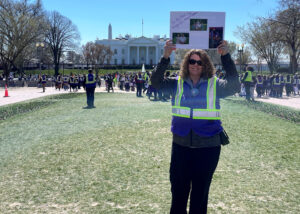Today, more than 6.5 million Americans are living with Alzheimer’s disease. That staggering number is expected to more than double to nearly 14 million by 2060.
The number of Americans who watch their loved ones battle this disease is drastically higher and includes 40 Square Board Director Beth Magnusson.
Magnusson’s mom is living with Alzheimer’s, giving her a firsthand look at the difficulties surrounding the disease – including health care accessibility.
“My mom was diagnosed with early-onset Alzheimer’s when she was 57 years old,” said Magnusson, who works at United Farmers Cooperative, a 40 Square investor-member. “We attended a walk to end Alzheimer’s and following the walk, I was asked if I’d be interested in being an ambassador for Minnesota Congressional District 7. I was willing to tell my story, and my mom encouraged it because she wants her illness to make strides in the medical world.”
That was the beginning of her journey as an Alzheimer’s Association ambassador for Minnesota’s 7th Congressional District, a position she holds alongside her sister. Recently, she traveled to Washington, D.C., with the Alzheimer’s Association to meet with her representatives and bring the association’s concerns to the limelight.
“When you’re out there, you don’t have to have a strong knowledge in how the different branches of Congress work,” said Magnusson. “It’s more important to be able to tell your story. That’s what sticks in our representatives’ minds.”

40 Square Board Director Beth Magnusson advocates for Alzheimer’s disease awareness during a visit to Washington, D.C.
Magnusson met with Rep. Michelle Fischbach’s office, Sen. Amy Klobuchar and Sen. Tina Smith while in D.C., and the main topic was to request that the congressional members urge the Centers for Medicare and Medicaid Services (CMS) to reverse their decision of denying Medicare coverage for FDA approved Alzheimer’s treatments. The group in D.C. began with a rally in front of the White House and followed up with office visits to each and every Congressional office.
Expanding the National Alzheimer’s Project Act (NAPA) was also at the forefront of their minds. NAPA was unanimously approved by Congress in 2010 and requires the Department of Health and Human Services to create a national strategic plan to address the Alzheimer’s crisis and to update it annually. The first edition of the National Plan to Address Alzheimer’s Disease was release in 2012.
“We want NAPA to get reauthorized,” Magnusson said. “There are still so many improvements to be made.”
The National Plan to Address Alzheimer’s Disease has six overarching goals:
- Prevent and effectively treat Alzheimer’s disease by 2025
- Enhance care quality and efficiency
- Expand supports for people with Alzheimer’s disease and their families
- Enhance public awareness and engagement
- Improve data to track progress
- Accelerate action to promote healthy aging and reduce risk factors for Alzheimer’s disease and related dementias
With over 11 million Americans providing roughly 16 billion hours – valued at nearly $272 million – of unpaid care for people with Alzheimer’s or other dementias, the Use of Medicare Care Planning Benefit was another item highlighted for representatives.
“It would implement a dementia care management model and streamline care across all of their doctors,” Magnusson said.
Other topics on the agenda for the day was the BOLD Infrastructure for Alzheimer’s Act and the Alzheimer’s Accountability Act. The BOLD Act establishes a public health infrastructure to address dementia and was unanimously approved in the Senate and passed in the House of Representatives by a 361-3 margin in 2018. The Alzheimer’s Accountability Act requires the scientists at the National Institutes of Health to submit an annual Alzheimer’s research budget proposal directly to Congress, bypassing the usual bureaucratic budget procedures, and specifies the resources that scientists need to reach the NAPA goal of preventing and effectively treating Alzheimer’s disease by 2025.
At the end of the day, Alzheimer’s infrastructure must be improved to make meaningful strides against this disease.
“For me, it’s therapeutic,” Magnusson said. “You’re surrounded by thousands of other people that are affected by this disease, they know the effects of the disease and they’re on the same page as everyone else. It provides us with a support system.”
With advocates like Beth Magnusson, Alzheimer’s disease will continue to be addressed at the national level, benefiting millions of people across the country.
For more information, please visit https://www.alz.org/.

